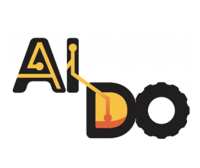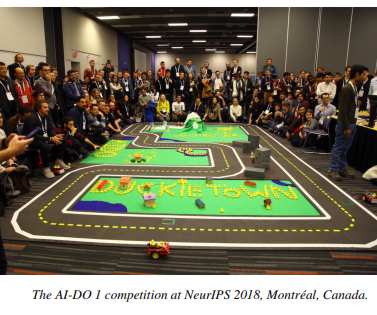| AI Driving Olympics - A Duckietown Challenge |
| Written by Lucy Black |
| Sunday, 17 March 2019 |
|
The AI Driving Olympics (AI-DO) is a competition focused around AI for self-driving cars. It made its debut in December 2018, at the machine learning conference NeurIPS and now teams are preparing for the second edition to be held at ICRA 2019 in May. As before it will be run using the Duckietown platform.
We first came across Duckietown in 2016, see Amazing Machines And Rubber Duckies, the year in which it originated at MIT as a graduate class. Its aim was to building a small-scale platform as a test-bed for real world challenges facing robotics and students designed and build Duckiebots to drive around a layout of roads and intersections. There were 24 students in the first class which was developed by 5 professors and 15 postdocs and on leaving MIT they dispersed worldwide so did Duckietown. By August 2018, when the Duckietown Foundation was launched, Duckietown classes had been taught in 10 countries with more than 700 alumni. With Duckietown established as a useful research tool and an environment for developing robotics literacy, a competition was the next step and it became the the official platform for the AI Driving Olympics, AI-DO, which includes a series of tasks of increasing complexity -- from simple lane-following to fleet management. This is a machine learning competition organized by the Duckietown Foundation in collaboration with six academic institutions: ETH Zürich (Switzerland), Université de Montréal (Canada), National Chiao Tung University (Taiwan), Toyota Technological Institute at Chicago (USA), Tsinghua University (China) and Georgia Tech (USA), as well as two industry co-organizers: nuTonomy (a self-driving car company) and Amazon Web Services (AWS). ETH Zurich's Emilio Frazzoli summed it up with: “The AI Driving Olympics offer a glimpse of the challenges of creating self-driving cars. A playful but rigorous competition on a smaller and safer testbed is the best way to develop the creativity needed to make progress in this field.” Lesson learned from the first edition of the competition have been published in the arxiv paper The AI Driving Olympics at NeurIPS 2018 authored by researchers involved it is organization. The paper outlines how Duckietowns are modular, structured environments built on road and signal layers that are designed to ensure a reproducible driving experience. A town consists of six well defined road segments: straight, left and right 90◦ turns, a 3-way intersection, a 4-way intersection, and an empty tile. Each segment is built on individual interlocking tiles, that can be reconfigured to customize the size and topology of a city. The researchers reveal that the results of AI-DO 1 highlight the need for better benchmarks, which are lacking in robotics, as well as improved mechanisms to bridge the gap between simulation and reality and the paper concludes: For science to advance we need a reproducible testbed to understand which approaches work and what their trade-offs are. We hope that the AI Driving Olympics can serve as a step in this direction in the domain of self-driving robotics. Submissions for AI-DO at ICRA 2019 open on April 1st, after which date researchers can submit algorithms to the challenge's servers. The challenge evaluation criteria will be finalized by April 15th. and real robot robot evaluations will take take place on May 1st. For those who do not have access to their own Duckiebot and Duckietown, the organizers hope to provide opportunities for testing of algorithms through online submission and remote running on Duckietown “robotariums” in Zurich, Chicago, or Montreal. The live competion, the final runs of the top ranking competitors, will take place on May 22nd in Montreal at ICRA.
More InformationThe AI Driving Olympics at NeurIPS 2018 by Julian Zilly, Jacopo Tani, Breandan Considine, Bhairav Mehta, Andrea F. Daniele, Manfred Diaz, Gianmarco Bernasconi, Claudio Ruch, Jan Hakenberg, Florian Golemo, A. Kirsten Bowser, Matthew R. Walter, Ruslan Hristov, Sunil Mallya, Emilio Frazzoli, Andrea Censi, Liam Paull
Related ArticlesAmazing Machines And Rubber Duckies ICRA 2015 - A Cornucopia Of Robots To be informed about new articles on I Programmer, sign up for our weekly newsletter, subscribe to the RSS feed and follow us on Twitter, Facebook or Linkedin.
Comments
or email your comment to: comments@i-programmer.info |
| Last Updated ( Sunday, 17 March 2019 ) |





